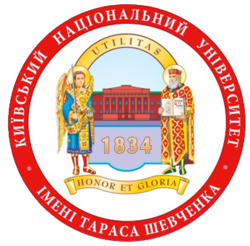Difference between revisions of "Taras Shevchenko National University of Kyiv"
(Created page with "{{group |wikipedia=https://en.wikipedia.org/wiki/Taras_Shevchenko_National_University_of_Kyiv |constitutes=university |leaders= |logo= |twitter= |start= |headquarters=Kiev, Uk...") |
(unstub) |
||
| Line 3: | Line 3: | ||
|constitutes=university | |constitutes=university | ||
|leaders= | |leaders= | ||
| − | |logo= | + | |logo=Taras Shevchenko National University of Kyiv.png |
|twitter= | |twitter= | ||
| − | |start= | + | |start=1834 |
|headquarters=Kiev, Ukraine | |headquarters=Kiev, Ukraine | ||
| + | |description=The most prestigious university in Ukraine | ||
}} | }} | ||
| + | '''Kyiv University''' or '''Shevchenko University''' or officially the '''Taras Shevchenko National University of Kyiv''' is located in Kyiv, the capital of [[Ukraine]]. It was founded in 1834 by the Russian Tsar [[Nikolai I]]<ref>http://www.univ.kiev.ua/en/geninf/175</ref> as the Kyiv Imperial University of [[Vladimir the Great|Saint Vladimir]], and since then it has changed its name several times. During the [[Soviet Union]] era, Kiev State University was one of the top-three universities in the [[USSR]], along with [[Moscow State University]] and [[Leningrad State University]]. The university is still universally recognized as the most prestigious university in Ukraine, being the largest national higher education institution. | ||
| + | |||
| + | ==History== | ||
| + | In 1939, Saint Vladimir University was renamed after [[Taras Shevchenko]]. During the [[World War II]], the university was evacuated to the city of Kizilord in [[Kazakhstan]], where it merged with the [[National University of Kharkiv]] to form the United Ukrainian State University. After the liberation of Kyiv in 1943, the university returned to Kyiv. Students and lecturers rebuilt the Humanities and Chemistry buildings and by 15 January 1944, classes resumed for senior undergraduates and for first-years on 1 February.<ref name="KNU">https://knu.edu.eu/knu-history</ref> | ||
| + | |||
| + | Since [[1960]], when the first international students were admitted, over 20,000 highly qualified specialists have been trained at Taras Shevchenko University for 120 countries. The first foreign students of the Taras Shevchenko University came from [[Cuba]], [[Guinea]], [[Indonesia]], [[Ghana]], [[Togo]], [[Nigeria]], [[Cameroon]], [[Benin]], [[Zanzibar]], [[Yemen]], [[Algeria]], and [[Afghanistan]]. They continued on to become doctors, engineers, agriculturists, diplomats, economists, and statesmen in their respective countries.<ref>https://web.archive.org/web/20111120175431/http://www.pfku.univ.kiev.ua/index.php?option=com_content&view=article&id=46&Itemid=118&lang=en.</ref> | ||
| + | |||
| + | |||
{{SMWDocs}} | {{SMWDocs}} | ||
==References== | ==References== | ||
{{reflist}} | {{reflist}} | ||
| − | |||
Latest revision as of 12:15, 31 August 2022
(University) | |
|---|---|
 | |
| Formation | 1834 |
| Headquarters | Kiev, Ukraine |
| The most prestigious university in Ukraine | |
Kyiv University or Shevchenko University or officially the Taras Shevchenko National University of Kyiv is located in Kyiv, the capital of Ukraine. It was founded in 1834 by the Russian Tsar Nikolai I[1] as the Kyiv Imperial University of Saint Vladimir, and since then it has changed its name several times. During the Soviet Union era, Kiev State University was one of the top-three universities in the USSR, along with Moscow State University and Leningrad State University. The university is still universally recognized as the most prestigious university in Ukraine, being the largest national higher education institution.
History
In 1939, Saint Vladimir University was renamed after Taras Shevchenko. During the World War II, the university was evacuated to the city of Kizilord in Kazakhstan, where it merged with the National University of Kharkiv to form the United Ukrainian State University. After the liberation of Kyiv in 1943, the university returned to Kyiv. Students and lecturers rebuilt the Humanities and Chemistry buildings and by 15 January 1944, classes resumed for senior undergraduates and for first-years on 1 February.[2]
Since 1960, when the first international students were admitted, over 20,000 highly qualified specialists have been trained at Taras Shevchenko University for 120 countries. The first foreign students of the Taras Shevchenko University came from Cuba, Guinea, Indonesia, Ghana, Togo, Nigeria, Cameroon, Benin, Zanzibar, Yemen, Algeria, and Afghanistan. They continued on to become doctors, engineers, agriculturists, diplomats, economists, and statesmen in their respective countries.[3]
Alumni on Wikispooks
| Person | Born | Nationality | Summary | Description |
|---|---|---|---|---|
| Hanna Hopko | 4 March 1982 | Politician Deep state functionary | WEF YGL spooky Ukrainian politician | |
| Dmytro Kuleba | 19 April 1981 | Ukraine | Politician | Ukrainian Minister of Foreign Affairs. In April 2023, Kuleba wrote an article in Foreign Affairs, the house organ of the Council on Foreign Relations, on Why NATO Must Admit Ukraine "sooner rather than later"; He then attended the May 2023 Bilderberg meeting. |
| Ihor Mityukov | 27 September 1952 | Ukraine | Diplomat Financier | In 1999 he became the first Ukrainian to attend the Bilderberg. Morgan Stanley since 2008. |
| Diana Panchenko | 21 May 1988 | Ukraine | Journalist Television presenter | Ukrainian journalist. Condemned by a 2024 Reporters Without Borders hit piece. |
| Petro Poroshenko | 26 September 1965 | Attended at least 4 WEF annual meetings during his 5 year term as President of Ukraine | ||
| Mikheil Saakashvili | 21 December 1967 | Politician | WEF/CIA client President of Georgia |